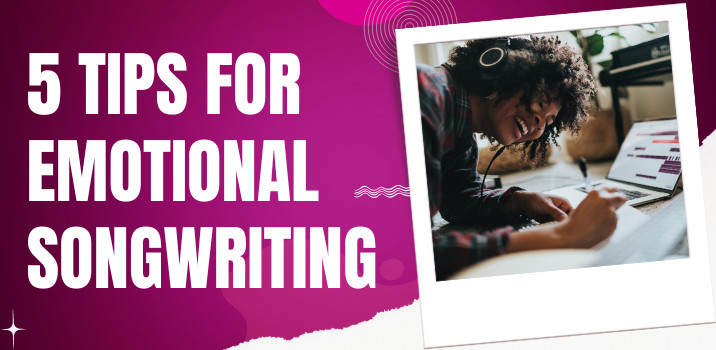5 Tips for Emotional Song Writing

30-March-2024
It's challenging to write lyrics that will connect you with your audience and convey emotions. It requires understanding the language, feelings, and timeless quality of lyrics. It also calls for the ability to tell a compelling story that impacts the audience. So, if you are about to write lyrics do follow the following tips. These will help you write memorable lyrics that resonate with listeners.
1. Know your audience Being aware of your target audience is one of the first steps towards producing songs that have resonance. Who do you want to hear from? What difficulties, needs, wants, and preferences do they have? What genre of music appeals to them, and why?
By determining the psychographics, preferences, and demographics of your target audience, you can produce content that speaks to their needs and wants. You can eliminate potentially off-putting elements and include those that they find pleasant by analyzing their musical tastes. You can make deeper connections by exploring the thematic and emotional elements that your audience finds appealing. You may build a closer relationship with your fans and make your lyrics more relatable by customizing them to fit their needs and preferences. By using this strategy, the artist and his audience might avoid possible alienation, offense, or boredom while simultaneously developing a deeper and more meaningful relationship.
2. Select Theme Choosing a topic and a message for your music is another way to write lyrics that speak to the listener. The theme is the central subject of your song, such as love, loss, freedom, or identity. A message is the particular idea or viewpoint you wish to express regarding the theme. For instance, identity is flexible, loss can spur personal development, freedom comes with responsibilities, or love is worth fighting for. You can write lyrics that are targeted, logical, and significant by having a distinct theme and message.
3. Use Figurative Devices, Different Rhymes, Rhythms and Melody Next, you should use different figurative devices, rhymes, rhythms and more to make your music lively. Words that appeal to the five senses—sight, sound, smell, taste, and touch—are called sensory details. The use of figurative language to conjure up vivid images in the listener's imagination, such as personification, similes, metaphors, or symbolism, is known as imagery. You can write memorable, passionate, and detailed songs by using sensory information and imagery.
To improve your song's musicality and appeal, try experimenting with rhymes and rhythms. Rhyme is when two comparable sounds, like moon and soon or sky and high, are repeated at the end of a word or sentence. The arrangement of stressed and unstressed syllables in a line, such as in anapestic tetrameter or iambic pentameter, is rhythm. The arrangement of pitches and tones is its melody. You may write catchy, melodic, and varied lyrics by experimenting with rhyme, rhythm, and melody.
4. Edit your Lyrics After you have finished your drafts, rewrite and edit them until they are polished and perfected. Do revision to add, remove, rearrange, or rewrite words or lines to improve the lyrics' content, structure, and flow. Then perform editing to align your song as per grammatical rules and conventions. It also entails making corrections to your lyrics' style, grammar, punctuation and spelling. You may write lyrics that are accurate, succinct, and clear by editing and revising them.
5. Get Feedback Feedback, comments, or suggestions from other people, such as family members, friends, other songwriters, or fans is very effective in writing songs to resonate with your audience. Testing is playing or recording your music and watching to see how your audience responds, including clapping, singing along, or exchanging ideas. ZOOM Recording Studio in LA helps aspiring and seasoned music artists produce professional-quality music. We offer feedback and suggestions at each step of music production. You can write meaningful, captivating, and powerful lyrics by trying them and gaining feedback.
Conclusion
You now have a ton of useful advice on how to compose lyrics that connect. Recall that writing meaningful lyrics is a process. Take your time and continue your exploration.